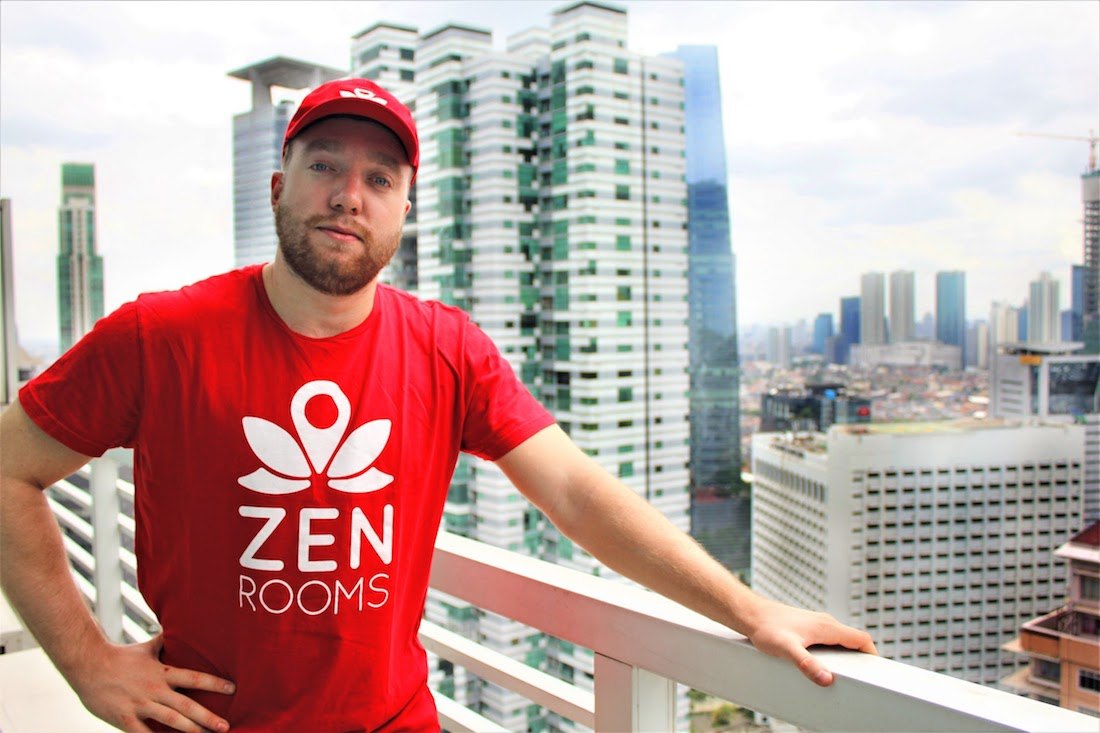
From Russia with hustle: Nikita Semenov. Photo credit: Zenrooms.
A senior role at a Rocket Internet startup is a highly coveted job.
The German venture builder has a stated preference for hiring people with prior experience in management consulting or banking, along with degrees from top-tier universities.
It manages to entice candidates away from places like Goldman Sachs and Deutsche Bank by offering them even higher salaries, fancy job titles, and sweeping powers to hire, execute, and grow companies quickly.
Such hires will learn a lot as they’re pitched into cutthroat environments where meeting ambitious targets is an absolute priority.
It’s certainly not everyone’s cup of tea, but Rocket’s immense reach and formidable brand equity are without doubt.
That’s what Nikita Semenov banked on when he applied for a position at Lamudi, Rocket Internet’s property portal.
He graduated with an MBA from the prestigious HEC Paris in 2014, starting work at an investment bank in Luxembourg shortly after. But he was having second thoughts only six months into his banker life.
“I realized I wasn’t learning anything substantial about building businesses – I was just wasting my time in an office working on spreadsheets,” Nik says about his time at Nordea Investment Funds in Luxembourg. “I wanted to acquire real skills.”
I had never been to Asia before.
Nik then did what he feels many others wouldn’t dare do – leave one of the hubs of global finance for the relative backwaters of Asia.
“HEC graduates are obsessed about finding highly-paid jobs in London or other parts of Europe,” he explains. “You waste the entire year just applying places and not developing your business acumen – it’s completely a CV game.”
The Russian native wanted none of that. He had his first interview with HR just a day after submitting his application to Lamudi. His second interview was with the global co-founder, where Nik outlined his career plans in detail and expressed a desire to get out of his comfort zone and get his hands dirty.
The next day he was offered a sales internship based out of Jakarta, which he accepted without a second thought. Nik flew into the Indonesian capital two days later.
“I had never been to Asia before and I wasn’t sure if Bali and Indonesia were the same things,” he laughs.
Diving in
Nik was entrusted with building a Lamudi sales team from scratch. The problem was that he had zero experience in anything remotely related to sales – his specialty was crunching numbers in Excel and structuring complex financial projections.
To exacerbate the problem, Nik didn’t speak a word of Bahasa Indonesia.
“You’re a new guy and everyone knows that. It’s a huge trust barrier you face in the beginning. Why should real estate developers do business with a white person who can’t even speak their own tongue?” he reminisces.

Yup, this is in Indonesia: Pura Ulun Danu temple, Bali. Photo credit: kamchatka / 123RF.
They key to overcoming these hurdles was hustle. Refusing to take no for an answer, he stuck to two strategies to win people over: follow up with leads constantly and explain the benefits of Lamudi’s online listings in painstaking detail.
Slowly but surely, attitudes started to change. In a couple of months Nik had built sales processes where none existed and started developing Lamudi’s playbook. He was also given the authority to hire more people – a team which eventually grew to five.
Weekly language lessons also helped him understand local culture and traditions, as well as the preferred way of doing business in Indonesia.
Absorbing pressure
“My time in Lamudi was full of challenges,” admits Nik.
In true startup fashion, he didn’t have a well-defined, linear role. Alongside sales, Nik was also asked to look at the marketing side of things – learning things like customer acquisition costs, cost-per-click, and other strategies used to understand how well the business was performing.
“Now I am quite proficient in it,” he says.
See: Rocket Internet closes new $420m fund
As his internship started drawing to a close, Nik began to sniff around for other opportunities within the Rocket Internet empire.
A fateful meeting with Rocket’s Kiren Tanna and Nathan Boublil locked in his next move. The duo had been tasked by Oliver Samwer to launch a so-called Uber for budget hotels startup akin to India’s Oyorooms. They were introduced to Nik in Lamudi’s Jakarta office.
He urges graduates not to settle for cushy career jobs in London or New York.
The foundations of the company were still a mystery – Kiren and Nathan would serve as the global heads, but they had yet to make any key hires.
After a few discussions, it was agreed that Nik would join Zenrooms with the title of co-founder and managing director for Indonesia. At the time, Zenrooms was simply just an idea that had tickled the fancy of the powers-that-be in Rocket. They hadn’t decided upon a name, there was no website, and not even a single hotel had been signed up.
“If you master the sales process, you can apply it in any industry,” states Nik. “I used the same strategies to convince hotels as I had done earlier with real estate developers in Lamudi.”
This time the pace of execution was even more relentless than before. Zenrooms formally launched in November 2015 after just a month in private beta. Within a month it had grown to 300 hotels in Indonesia alone, with a team of six salespeople in different cities.
“We were working 24/7 from a small office in GEPI Incubator in Jakarta. I remember people complaining of us being noisy while doing sales calls. But we had to grow at Rocket speed. Discipline in work and freedom in opinion were and still are a crucial part of our culture,” affirms Nik.

A Zenrooms pad in Singapore. Photo credit: Zenrooms.
After the quick rollout in Indonesia, Nik was asked to expand the business in Sri Lanka, Singapore, and Hong Kong.
It was a familiar story for him – he didn’t have many local contacts on the ground and had to adapt to different ways of doing business in new places.
But his experience held him in good stead. Zenrooms is now present in Indonesia, Thailand, Philippines, Sri Lanka, Singapore, and Hong Kong. The model was so infectious that Rocket even launched it in Brazil.
No micromanaging
Nik’s spent barely two years at the German startup leviathan, but that already makes him a veteran by Rocket Internet standards. He dismisses the criticism frequently directed at Rocket’s culture, as well as the high rate of employee attrition.
“It’s a complete myth,” he says in reference to reports of staff stress and poor management practices. “Maybe it was a bit like this in the past, but in Lamudi and Zenrooms all key employees have been there since inception and no one moved out.”
We have to be bullish and aggressive, otherwise we’ll miss the opportunity.
“However, each startup is unique and each team is unique. I take pride in the fact that my employees have stayed with me for a long time, with only two or three resignations. We work for the idea, the experience, and the thrill.”
Nik – who has 70 people reporting to him – says absolute transparency and regular feedback is key for fast-growing startups. It ensures the team’s on the same page and any signs of burnout or stress are dealt with immediately.
What helps is that Rocket Internet has a truly global footprint – and portfolio startups are encouraged to share local knowledge and trends with each other. When Zenrooms expanded to the Philippines, for example, Nik was able to solicit advice from Lamudi’s local team. That assisted him with hiring as well as coordinating a media strategy.
“Yes, everyone on the team has challenging KPIs,” he admits. “But if you meet them, then no one’s going to bother you or do any micromanaging. And we have to be bullish and aggressive, otherwise we’ll miss the opportunity.”
Smart hires are another priority – with 25 percent of Nik’s time now spent screening resumes, interviewing people, and making job offers. The Rocket Internet brand helps attract top-tier talent, but attitude and self-motivation are important elements that can’t necessarily be taught.
See: Rocket Internet lost $682m so far this year
“It’s also very important to show leadership by building trust within your team. The only way to build trust is to show by example. I was never afraid to do all ‘dirty work’ by myself. You also learn a lot from it,” he adds. “ Bad bosses will drive you nowhere and will never give credit”.
The eventual goal for the aspiring Russian entrepreneur is to start his own company from scratch, but he says he’s completely committed to the Zenrooms project for now. “I will not leave until it’s super successful,” says Nik.
He urges graduates not to settle for cushy career jobs in London or New York.
“Working at Rocket will teach you way more than a business school ever could. Yes, it’s tough and we work super hard. But hardly any company will give you the flexibility and independence to build something on your own and develop as a leader in your own right,” says Nik.
This post He joined Rocket as an intern. Now he’s a co-founder at one of its hottest startups appeared first on Tech in Asia.
from Tech in Asia https://www.techinasia.com/zenrooms-rocket-internet-story-founder
via IFTTT
No comments:
Post a Comment